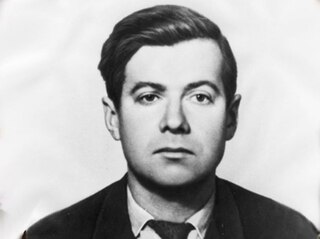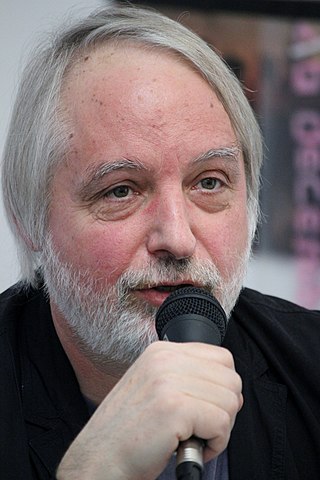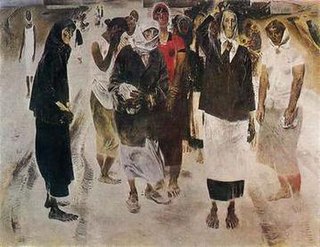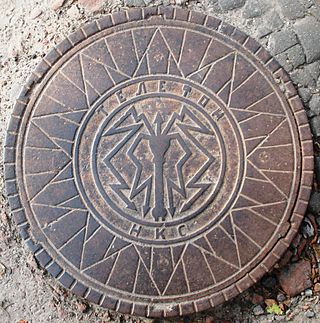
Vladislav Markovich Illich-Svitych was a Soviet linguist and accentologist. He was a founding father of comparative Nostratic linguistics and the Moscow School of Comparative Linguistics.
The Morozovs is a famous Old Believers Russian family of merchants and entrepreneurs. The family name Morozov originates from a Russian word moroz (мороз) that means frost. The founder of the family was Savva Vasilyevich Morozov (1770–1862). He had five sons and a daughter, Varvara Savvichna Morozova.

Julian Alexandrovich Scriabin was a Swiss-born Russian composer and pianist who was the youngest son of Alexander Scriabin and Tatiana de Schloezer.
Abram is a male given name of Akkadian origin, meaning exalted father in much later languages. In the Bible, it was originally the name of the first of the three Biblical patriarchs, who later became known as Abraham.

Nikita Vasilyevich Petrov is a Russian historian. He works at Memorial, a Russian organization dedicated to studying Soviet political repression. Petrov specializes in Soviet security services.

The Ministry of Communications of the Union of Soviet Socialist Republics (USSR) (‹See Tfd›Russian: Министерство связи СССР) was the central state administration body on communications in the Soviet Union from 1923 to 1991. During its existence it had three names: People's Commissariat for Posts and Telegraphs (1923–32), People's Commissariat for Communications (1932–46) and Ministry of Communications (1946–1991). It had authority over the postal, telegraph and telephone communications as well as public radio, technical means of radio and television broadcasting, and the distribution of periodicals in the country.

People's Commissariat for Posts and Telegraphs of the RSFSR, known shortly as the Narkompochtel, was the central organ of government of the RSFSR that was in charge of the organisation and development of the different forms of communication, including postal service. It was founded in Petrograd on 7 November [O.S. 25 October] 1917 from the Russian Ministry of Posts and Telegraphs and retained its organisational structure.
The year 1963 was marked by many events that left an imprint on the history of Soviet and Russian fine arts.

Ivan Abramovich Morozov was a Russian businessman and, from 1907 to 1914, a major collector of avant-garde French art.

Freemasonry in Russia started in the 18th century and has continued to the present day. Russian Freemasonry pursue humanistic and educational purposes, but more attention is given to ethical issues. It was a spiritual community of people united in an effort to contribute to the prosperity of the Motherland and the enlightenment of the people living in it.

Mothers, Sisters is a 1967 painting by Russian artist Yevsey Moiseyenko (1916–1988).
Natalya Yevgenevna Semper was a translator, Egyptologist, artist and memoirist.

Moscow Society of Philatelists and Collectors was one of the first philatelic organisations in Soviet Russia that appeared in Moscow in 1918. Later on, it ceased and was replaced with the All-Russian Society of Philatelists.

Moscow Society of Stamp Collectors was one of the first philatelic organisations in the Russian Empire that was created in Moscow in 1883. Later on, it was dissolved and restored in 1907.

The People's Commissariat for Communications of the USSR was the central state agency of the Soviet Union for communications in the period 1932 to 1946. The Commissariat administered the postal, telegraph and telephone services.

People's Commissariat for Posts and Telegraphs of the USSR was the central organ of the Soviet Union government that was in charge of the organisation and administration of the different forms of communication including posts. It existed between 1923 and 1932.

The State Museum of Modern Western Art was a museum in Moscow. It originated in the merger of the 1st and 2nd Museums of Modern Western Painting in 1923. It was based on the collection of paintings assembled by Sergei Schukin and Ivan Morozov. It was shut down on 6 March 1948 by Stalin and its works split between the Hermitage Museum in St. Petersburg and the Pushkin Museum in Moscow.
Arseny Abramovich Morozov (1874-1908) was a member of the Morozov dynasty. He had a reputation as a playboy.

Taking a Snow Town is a painting by the Russian artist Vasily Surikov (1848–1916), completed in 1891. It is kept in the State Russian Museum in St. Petersburg. The size of the canvas is 156×282 cm. The painting depicts the climax of an ancient folk game popular among the Siberian Cossack community. According to tradition, the game was organized on the last day of Maslenitsa, and the artist, who grew up in Krasnoyarsk, observed it many times during his childhood. Surikov worked on the canvas during his stay in Krasnoyarsk from 1889 to 1890, and finished it after his return to Moscow. Many of his relatives and acquaintances served as sitters.

Nathan Aleksandrovich Schneersohn – a Russian Menshevik revolutionary and Soviet museum curator, the founder and first director (1920–1937) of the New Jerusalem State Museum of History and Art, located near Moscow in the monastery of the same name. He was also the addressee of the text by Vladimir Lenin published as a separate brochure in Geneva in 1904 under the title "Letter to a Comrade on Our Organizational Tasks".















